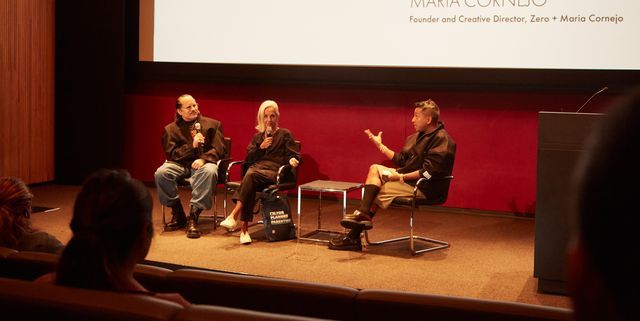
Yesterday, two independent New York designers got together to have a chat about what it means to find your voice. For Willy Chavarria and Maria Cornejo, searching for that inner spark has been a process with high highs and low lows, but it’s brought both to a place of self-assurance. They discussed their trajectories and more during a panel discussion that was a part of Hearst Publications’s series “The Beauty of Latinx Design” and was led by Harper’s Bazaar Accessories Director Miguel Enamorado.
While Chavarria is celebrating the success of his eponymous independent label after staging what many said was the best show of New York Fashion Week’s spring 2024 season, Cornejo is set to receive the CFDA Geoffrey Beene Lifetime Achievement Award in November. The topic of their discussion was titled “The Rebellious Spirit of Resilience” and indeed, there are no two designers better equipped to create dialogue around what it takes to stick to one’s convictions, cultivate community, and make clothes that have something real to say.
Cornejo, who has long been a political activist in addition to her design work, was born in Chile and moved with her family to England when she was 12 to escape dictatorship. In the mid-90s, she left for New York where she opened her first studio space in Nolita. It was there that her sustainable label Zero + Maria Cornejo was born, and where she first began attracting a loyal following of women, the likes of Michelle Obama and Christy Turlington included, who are obsessed with her eco-friendly materials and free-flowing, unencumbered silhouettes.
“I’ve always tried to do things in an authentic way,” she told Enamorado yesterday. “Whether it was in terms of sustainability or as a woman designer dressing women. Maybe that’s rebellious but I didn’t know any other way, that’s the way I work. I don’t think it’s a conscious thing to be rebellious.”
Cornejo has forged her own path within an industry that is not always welcoming or inclusive when it comes to upstart brands and designers who come from different backgrounds outside the majority and the major fashion capitals. As she explained, “I always believe in dressing your peers, dressing the women that you love, dressing your friends and the women that you respect.” She added, “I have my life and my social beliefs so I can only relate to that. My reality as a designer is that I went to England as a political refugee when I was 12, so to me clothes are quite political. You reflect the time you live in, the people you work with and the artists and the women that you love. That’s all we can do, I think.”
Chavarria, who is Mexican-American and Irish-American, echoed these sentiments, explaining that, “in this business, in order to be a designer, you have to have a really strong voice of your own and that is a form of rebellion.” He added, “It’s almost like you have to be rebellious to be successful as a great designer.”
He too has certainly done things his way and gained momentum as a result. While he was in school, he found work in the shipping department at the brand Joe Boxer, spending off time sketching his own designs, which were soon noticed by the company’s higher ups. He got an internship with the brand’s founder Nicholas Graham and eventually worked his way up to a full-time design position. Later, he worked for Ralph Lauren and several other labels before launching his first menswear label, Palmer Trading Company. In 2015 he founded his eponymous label and in 2021, in the midst of growing it, was appointed senior vice president of design at Calvin Klein.
Growing up in a rural, Mexican-American community in Fresno, California, Chavarria explained that “there was no fashion. There was style and people had a sense of self and they would dress themselves in the ways that they would identify with a certain group of people.” He added, “I was always fascinated with that and as I got older and learned that you could make a living making clothes I got really into it and for me, my growing up wasn’t really looking at magazines or Imstagram (there was no Instagram), but it was really about studying the way people would dress to represent themselves.” He agreed with Cornejo who noted that “the way we dress is political,” and he went on to say that “we have that luxury that we can choose to purchase clothes and dress ourselves in a way that reflects who we are affiliated with how we want to be perceived and in the larger picture reflects the times that we live in and it reflects a past, the current and I’ve always seen the political side of things.” “Growing up in a Mexican-American household with parents that were part of the civil rights movement I was always raised to hear the words of Cesar Chavez and Martin Luther King Jr., I was always very aware of politics whatever my work turned out to be.”
Both Chavarria and Cornejo have this socio-sartorial mindset when it comes to their creative outputs, but they also agree that, especially within the Latinx community of designers, all of their work needs to be based in the pursuit of optimism. As Chavarria explained, “The Latin culture, we’ve remained resilient and we come back with color and flowers and laughter and Dia de Los Muertos, we’re such a vibrant culture.” He added, “it’s so important to maintain the goodness and the positivity of what we do. In everything we do in fashion and even not in fashion, it’s so important to remember to be good to one another and to be generous with one another and be loving.” And even at their most rebellious, Cornejo agrees that, “our job as designers and creatives is to bring joy and beauty to this world.”

